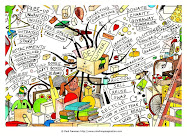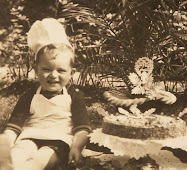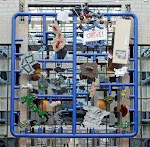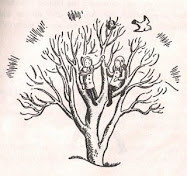
 Given my current disinclination to Twitter, I found myself intrigued by this article by Matt Bai in last week's Sunday magazine of The New York Times: "The Chatty Classes: Why Twitter is the Last Thing D.C. Needs." This paragraph, especially, stood out:
Given my current disinclination to Twitter, I found myself intrigued by this article by Matt Bai in last week's Sunday magazine of The New York Times: "The Chatty Classes: Why Twitter is the Last Thing D.C. Needs." This paragraph, especially, stood out:Made it to DC, next stop baggage claim,” Craig Fugate, Obama’s choice to run the Federal Emergency Management Agency, tweeted upon arriving in Washington last month. A half-hour later, he reported, “No bag — great start in DC, the future of things to come?” Fugate’s luggage finally arrived the next morning, about an hour before he dashed off this mini-haiku: “Alice in Wonderland, getting morning star bucks.” Which kind of makes you wonder: if the head of FEMA feels that disoriented buying a latte near the White House, what’s going to happen during a tornado?
Indeed. Bai says: "However current it may be technologically, Twitter seems somehow out of step in its political sensibility — that is, in the promise of false intimacy between politicians and voters." He suggests that "in this new age of reckoning for all that we’ve failed to accomplish, voters seem to have tired of what pollsters call the 'understands people like me' question. Now, it seems, they want politicians to stop sharing and just govern like adults."
And whatever else Americans may be craving in our politics these days, brevity and immediacy aren’t among them. Politics today is already too simplistic and binary, its news cycle more comically truncated and ephemeral than at any time in our history; in the age of e-mail, blogs and smartphones, we seem to react to everything with a kind of frantic, predictable impulse (Tax all the bonuses! Kill all the pirates!) rather than with a longer-term consideration of benefits and consequences. The last thing Washington needs right now is politicians who seek to convey the moment in even shorter slogans and commentators who feel the need to offer their wisdom with even more frequency and glib abandon than they already do on blogs and cable TV.
I'm hoping that it is in fact true that Americans do want more substance from their leaders. Twitter at the top may communicate a fleeting impression of intimacy – a sense of "transparency" in government – that serves as a corrective to magical thinking about omnipotent politicians. It sends out short telegrams about individual limitations, the inability of anyone to be in control of even the unintended consequences of their own most commonplace observations. (I bet Fugate had a morning choke over his coffee when he found his tweets recontextualized, with a critical assessment, in the Sunday mag.)
Lasting change of our own devising? It's a more complex thing, one that may not benefit much from the background noise – the static – of periodic false intimacy with policy makers.
That's a photo of Matt above: notice the absence (in this image, anyway) of a handheld device.







































































































































.jpg)









































































































































.jpg)









































































































No comments:
Post a Comment